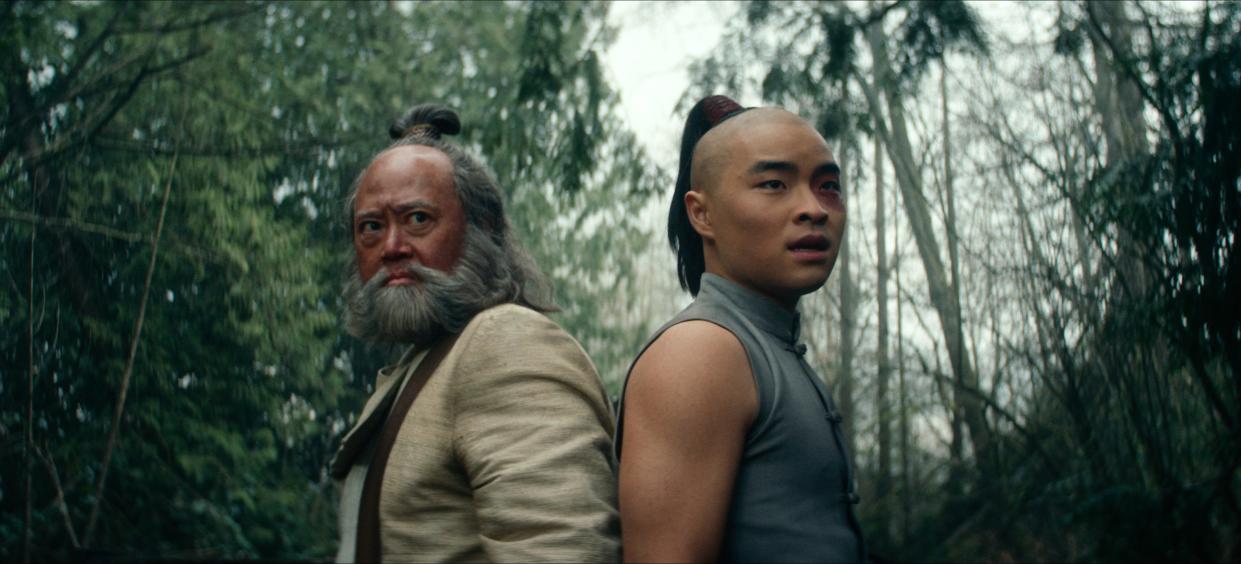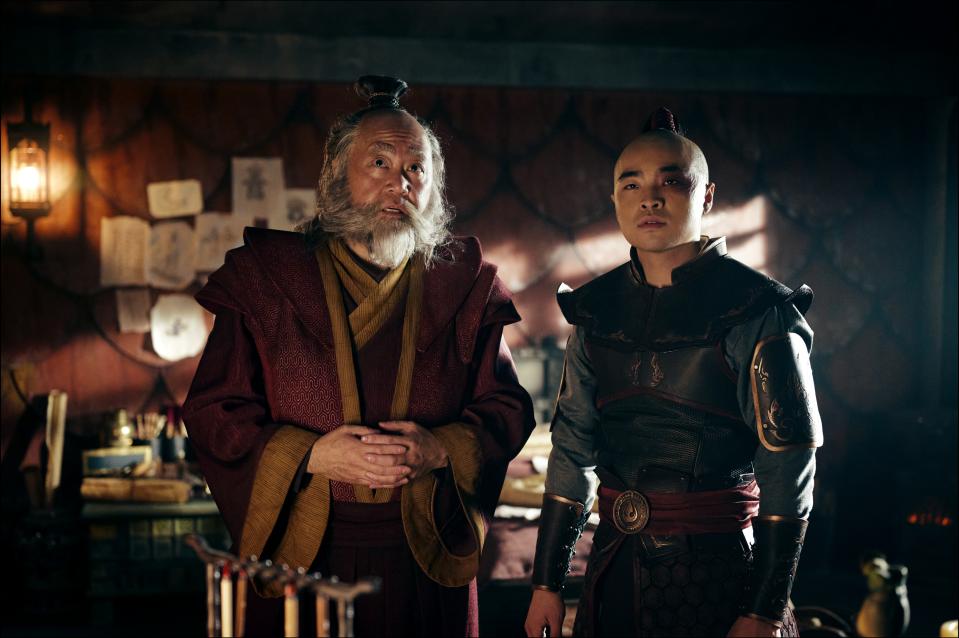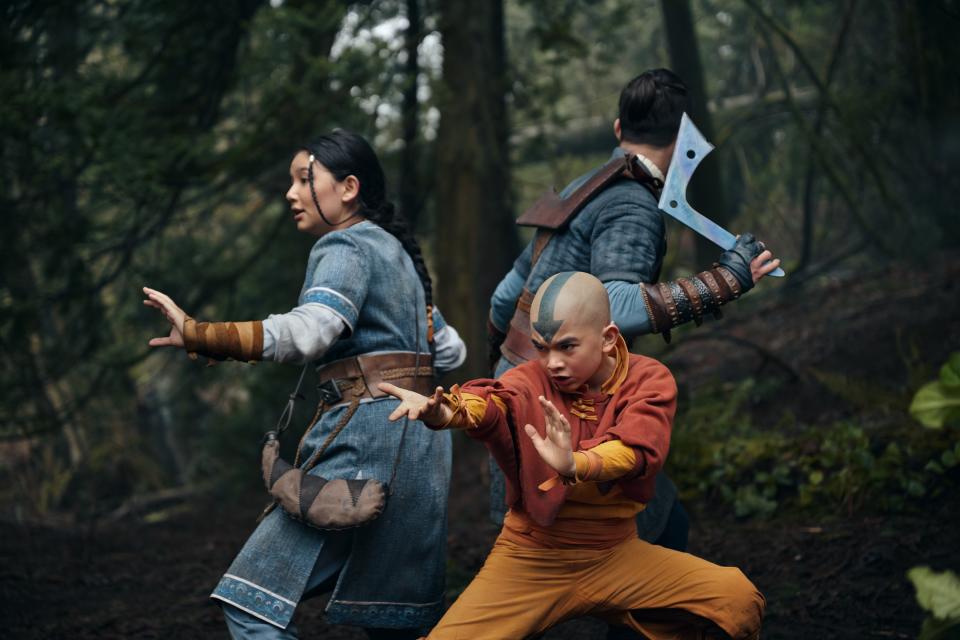Yes, a Certain Fan-Favorite Song Is Still in the Live-Action ‘Avatar: The Last Airbender’ — but Not How You Think

- Oops!Something went wrong.Please try again later.
- Oops!Something went wrong.Please try again later.
One of the riskiest scenes in Netflix’s new “Avatar: The Last Airbender” adaptation has nothing to do with any of the four elements, flying a 12-year-old over the skies of the Earth Kingdom, or the nefarious schemes of the extremely hot Fire Lord Ozai (Daniel Dae Kim). It’s a simple two-minute scene tucked in the middle of Episode 4, mostly shot-reverse shot, nothing fancy. Of course, you don’t need that many camera positions to shoot a funeral.
This funeral is a new twist and old information in the story of “Avatar: The Last Airbender” — and an example of the live-action adaptation at its most successful in both deviating from and honoring its source material. The original animated version of “Avatar” had 20 episodes per season to slowly tease out its characters’ depth, even those loyal to the Fire Nation who have been trying to destroy the Avatar (hence why our hero Aang is the last airbender) and conquer the world. It’s over halfway through the original series’ run that we learn General Iroh, voiced in Seasons 1 and 2 by Mako Iwamatsu and in Season 3 by Greg Baldwin, wasn’t always the impish tea-loving old fart looking after his nephew Prince Zuko as they hunt for the Avatar.
More from IndieWire
In Live-Action 'The Last Airbender,' Look for Character Clues in the Fight Choreography
Richard Lewis, Comedian and Beloved 'Curb Your Enthusiasm' Star, Dies at 76
Iroh once had a son of his own, Lu Ten, and in one of the most poignant moments in the series, the retired general goes to his son’s grave, wishes him a happy birthday, and sings a song. Often short-handed as “Leaves from the Vine” or “Little Soldier Boy,” it’s easily one of the most touching moments and iconic songs in a series that’s full of both. Fan lore even has it that this was the last thing Mako recorded for the series before his death — the episode, “Tales of Ba Sing Se,” is dedicated to him.
Replicating that exact moment would inevitably pale in comparison to the original, and to its great credit, the live-action series doesn’t try. Instead, what it does is create something that feels, in the words of Netflix’s “Avatar: The Last Airbender” showrunner Albert Kim, “fresh, but familiar.” And composer Takeshi Furukawa’s score acts as the bridge, providing us something core to the original but in a completely new way.
Instead of the graveside moment happening in the present, the Netflix series flashes back to Lu Ten’s funeral, Iroh (Paul Sun-Hyung Lee) sitting expressionless and alone in a chair beside the coffin. He receives praise but no comfort from Ozai with a kind of moody orchestral underscore highlighting the severeness of the Fire Nation. More hopeful strings begin to swell as a younger, softer Zuko (Dallas Liu) steps up to speak equally bland platitudes to his uncle.
But then, just as he’s walking away, Zuko shares a personal keepsake of Lu Ten’s. It’s in that moment of connection between Zuko and Iroh, the beginning of this new father/son relationship we see over the course of the series, when a piano version of the original “Leaves from the Tree” theme plays. By the time the string section joins in and Zuko sits down beside Iroh, the emotional weight of the original theme has hit fans with the force of a giant badgermole.

Furukawa uses the original Jeremy Zuckerman composition — one of only a few very key themes he was allowed to bring over to the live-action “Avatar” — but applies his own philosophy to it. “Jeremy’s score, and he does a fantastic job of it, relies on a lot of world instruments,” Furukawa told IndieWire. “I didn’t want to try to emulate what he had done because I would fall short. So my contribution was to bring a big orchestra — I’m an orchestral composer by training — so it makes it feel grand and epic.”
But Furukawa’s cue, “Lu Ten’s Funeral,” shows how simple, melodic choices can transport us to a place of epic emotions. “There was an old posting at one of the art schools I visited while I was in college, where it just said on the wall, ‘Just because you can doesn’t mean you should.’ And that’s always stuck with me,” Furukawa said. “Just leaving space, not being verbose, letting the moment breathe.”
That creative restraint and respect for the music also animates (no pun intended) the cues where Furukawa utilizes all 98 members of the orchestra he assembled to score the Netflix series. “A lot of modern Hollywood scores use orchestras in a very modern context. They combine it with synths, with computer-generated, sampled percussion and such. My musical voice tends to lean a little bit more old school,” Furukawa said. “It’s one thing when the orchestra musicians are playing like one note going on for two minutes in a cue, but when they’re playing melodies and soaring lines and beautiful harmonic progressions… It sounds big because that’s the way you’re able to coax that sound out of the players.”

The scope that Furukawa is able to bring to the “Avatar: The Last Airbender” score is evident in its sweeping setpieces, like Furukawa’s theme for Omashu that builds Persian chord progressions in line with the dizzying levels of that city, the painfully proud horns that tend to accompany Zuko, and the soaring chorus and pounding drums that form a sonic mirror to the ice walls of Agna Qel’a. But a wider sense of scope is felt just as clearly in Furukawa’s rearranging of “Leaves from the Tree” to start with a single instrument and then adding more orchestral voices until we feel that it could burst.
“When I got that theme in from Takeshi Furukawa, our brilliant composer, I got so emotional just listening to it — not even as background for the scene, just listening to the score itself,” Kim told IndieWire. “I’ve got it on my phone. I play it all the time. It’s incredible — and we didn’t even use the lyrics.”
An adaptation’s score is one of the few things that can directly copy the original note for note (though to potentially diminishing returns). But just as Aang (Gordan Cormier) can interact with his previous incarnations but ultimately needs to forge his own path, Furukawa always iterates on the existing material to create a sound that’s as emotionally expansive as the world of “Avatar.”
“There’s nowhere higher to go than a franchise like this, both artistically and just the scope,” Furukawa said. “I hope that our incarnation feels big and cinematic.”
Best of IndieWire
Christopher Nolan Movies, Ranked from 'The Dark Knight' and 'Tenet' to 'Dunkirk' and 'Oppenheimer'
Where to Watch This Week's New Movies, Including 'Argylle' and 'How to Have Sex'
Christopher Nolan's Favorite Movies: 40 Films the Director Wants You to See
Sign up for Indiewire's Newsletter. For the latest news, follow us on Facebook, Twitter, and Instagram.

